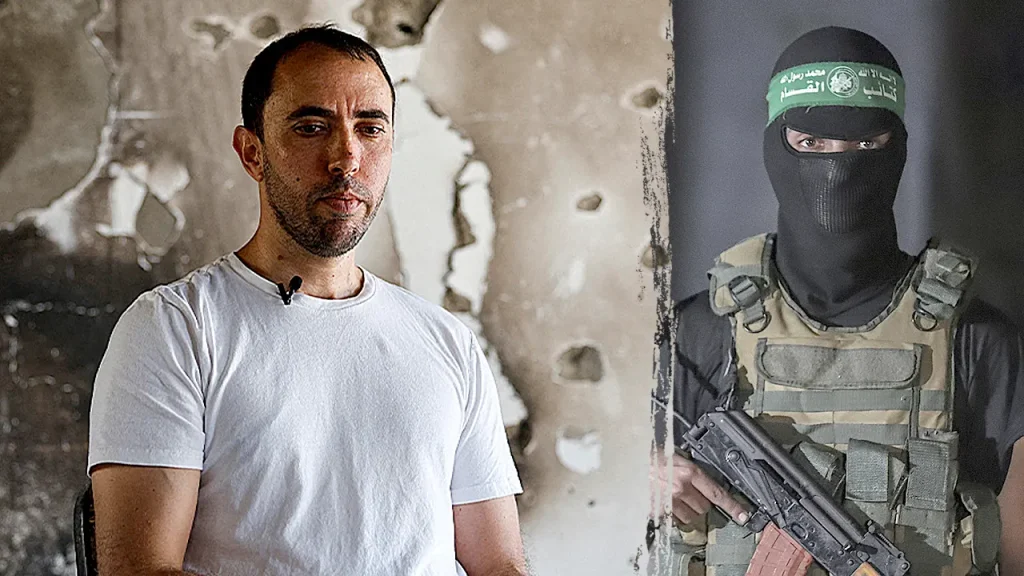From Captivity to Freedom: A Former Israeli Hostage’s Tale of Survival
In a poignant account from southern Israel, former Hamas hostage Tal Shoham revealed surprising insights about his captors after enduring over 500 days in captivity. Speaking candidly before the recent hostage release, Shoham described his shock at discovering the ordinary backgrounds of his Hamas guards. “One of the guards was a first-grade teacher, another was a lecturer at a university, and another was a doctor. These are normal people becoming terrorists,” he told reporters from The Times of Israel. This revelation challenges our understanding of who becomes radicalized and why, suggesting that extremism can take root in the most ordinary lives. Shoham emphasized that most of his captors were “not soldiers” but civilians who had embraced violence for various reasons.
What struck Shoham most deeply about his captors was not their religious fervor but their psychological conditioning. Despite experiencing “torture and cruelty” at their hands, he observed that while they were “brainwashed and full of hate,” religious motivation wasn’t always the driving factor. “Some of them were religious, but some were only there because this is the popular thing to do. They can take all sadistic thoughts and actions not just against Israelis but also Gazans,” he explained from Kibbutz Beeri. To illustrate this point, Shoham recounted witnessing a Hamas guard shoot a Gazan man in the knees merely for “looking suspicious.” Later, as the wounded man received medical treatment, the captors “decided that he should die” and killed him—revealing a disturbing willingness to inflict violence even on their own people.
Shoham’s personal ordeal began on October 7 when he was abducted from Kibbutz Beeri alongside his wife, two young children, and other family members. While his family was freed in November 2023 during an initial prisoner exchange, Shoham remained in captivity until February, when he was released as part of a smaller Qatari and Egyptian-brokered deal. His release came through an agreement that freed several remaining Israeli civilians in exchange for Palestinian prisoners. Throughout his long captivity, Shoham endured severe physical deprivation, surviving on a starvation diet of “only 200 to 300 calories a day” while being held in Hamas tunnels. Adding to this cruelty was the knowledge that aid was available but deliberately withheld: “I saw with my own eyes that they stole boxes and boxes of humanitarian aid from Egypt, from Turkey, from the Emirates, but they didn’t agree to give us any of this food in the tunnels,” he recounted.
The psychological impact of prolonged captivity forced Shoham into a profound internal journey. “Being in captivity forced me to go inward,” he reflected. “Only a few people mattered to me, my family and a few close friends.” This narrowing of his emotional world became a survival mechanism, allowing him to focus his limited psychological resources on what truly mattered. A crucial turning point came when he learned that his wife and children had been released on the 50th day of their captivity—news that provided “tremendous” emotional sustenance during his continued imprisonment. Despite the trauma he experienced, Shoham emerged from his ordeal with an unexpected spiritual transformation: “I have a lot of gratitude for life. My faith in humanity and in God only increased. It is much more spiritual and religious than before.”
The broader context of Shoham’s release unfolded against the backdrop of ongoing efforts to free the remaining hostages. Recently, twenty living hostages were released as part of a peace deal brokered by President Donald Trump. The agreement also stipulated that Hamas return the bodies of 28 deceased captives—a condition the terror group has yet to fully honor. Hamas has claimed that returning the bodies would “take time” because they were buried in tunnels and remain under rubble—an explanation that Israeli officials view with skepticism, considering it a violation of the deal’s terms. This ongoing struggle to secure the return of all hostages, both living and deceased, highlights the complex and often frustrating nature of negotiations with Hamas, even after formal agreements have been reached.
Shoham’s testimony offers a rare window into the reality of captivity under Hamas while raising profound questions about the nature of radicalization and human cruelty. His observations about his captors—everyday people who became capable of extreme violence—challenge simplistic narratives about terrorism and extremism. Perhaps most remarkably, despite enduring unimaginable hardship, Shoham emerged with his humanity not only intact but enhanced, finding deeper spiritual meaning and gratitude through his suffering. As the remaining hostages adjust to freedom and others still await the return of loved ones’ remains, Shoham’s experience serves as both a warning about the human capacity for cruelty and an inspiring testament to resilience in the face of extreme adversity. His story reminds us that even in the darkest circumstances, the human spirit can find pathways to meaning, connection, and ultimately, a renewed appreciation for life itself.













